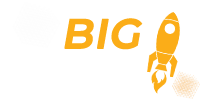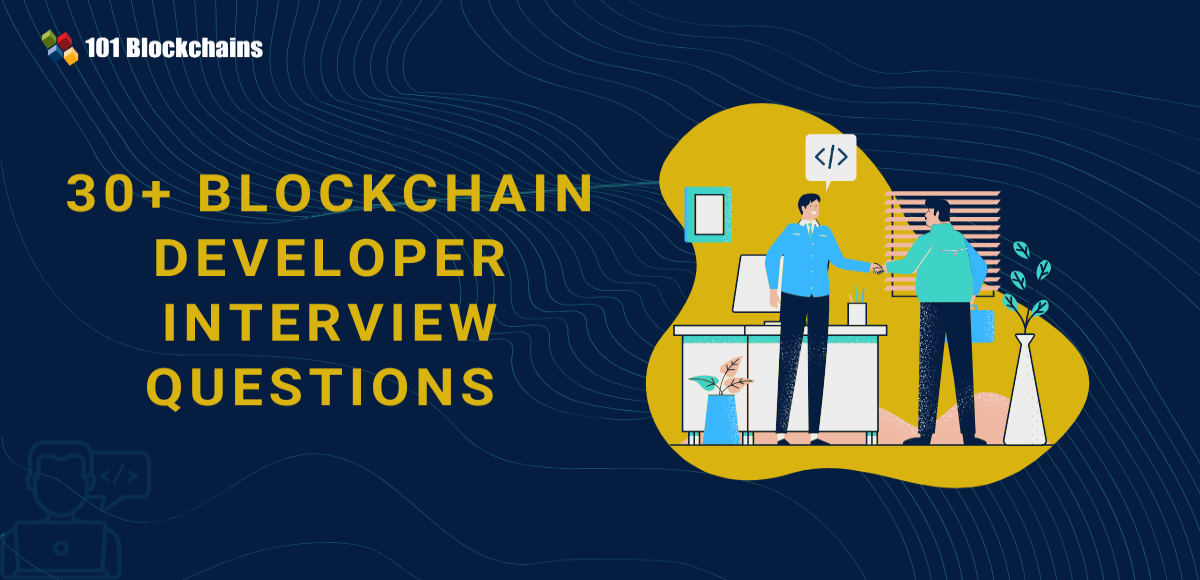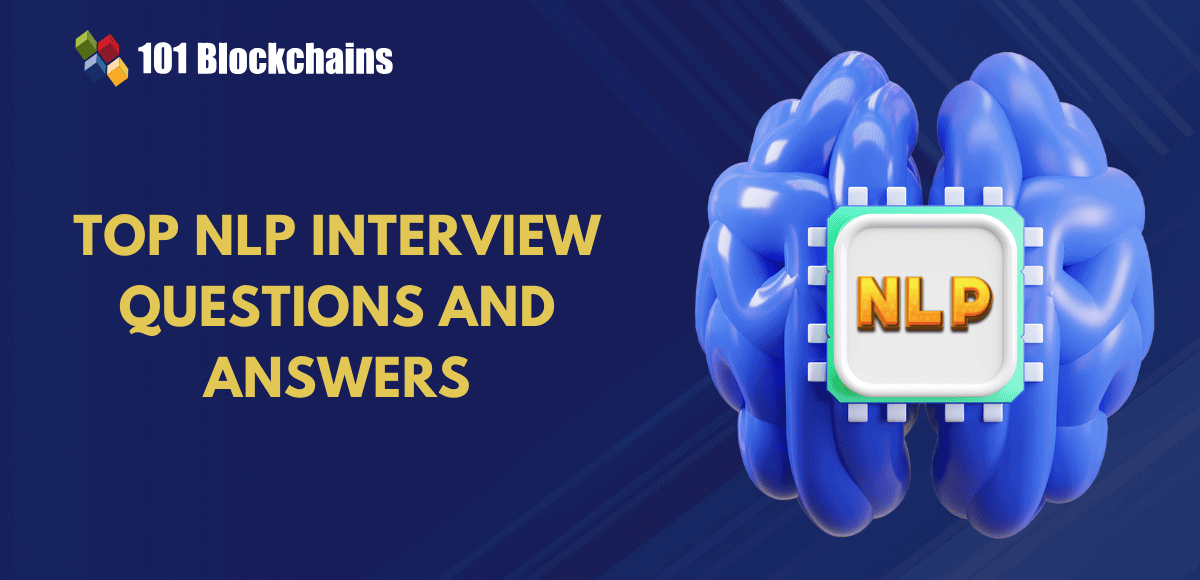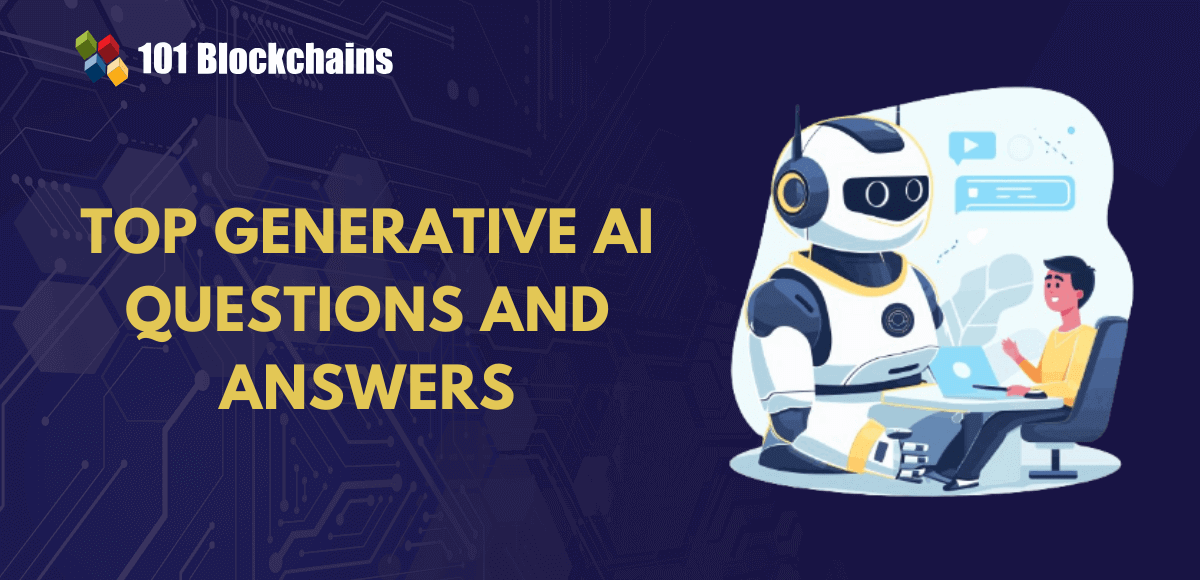Learn how blockchain truly works, master key definitions, and uncover what makes smart contracts so "smart." Dive into the fundamentals, gain valuable insights, and start your blockchain journey today!
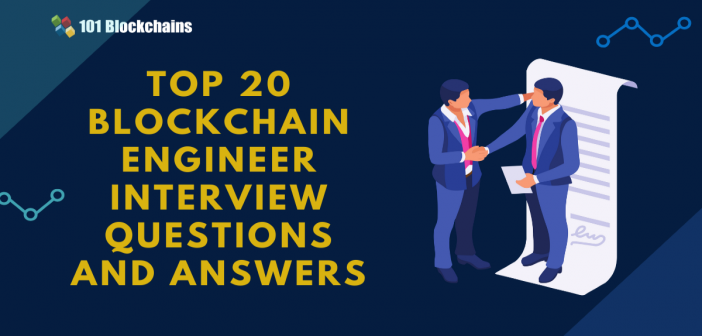
- Interview Preparation
Diego Geroni
- on May 09, 2021
Top 20 Blockchain Engineer Interview Questions and Answers
Aspiring to become a Blockchain Engineer? Here’s a compilation of top blockchain engineer interview questions that will help you prepare for the interview.
The global pandemic has brought forward a massive new wave of digital transformation geared towards the future. With remote working being a top concern for all enterprises in present times, many enterprises are considering innovative solutions to foster digital transformation. Blockchain technology is presently one of the top alternatives that can help enterprises in achieving digitalization. Therefore, the rising demand for blockchain engineers has sparked widespread interest in blockchain engineer interview questions.
However, many aspiring professionals and newcomers are constantly worried about finding the best blockchain engineer interview questions. Interview questions are designed for determining whether a candidate with blockchain skills and knowledge can help the employer in achieving their enterprise objectives. So, where should you go for finding the most popular blockchain engineer interview questions? Here’s a guide to help you out.
Build your identity as a certified blockchain expert with 101 Blockchains’ Blockchain Certifications designed to provide enhanced career prospects.
Top Blockchain Engineer Interview Questions
The first thing that you should know about blockchain engineer interview questions directly point towards the varying levels of complexity. When you start off in an interview, you are likely to come across the top blockchain engineer interview questions focused on the fundamentals of blockchain.
If you are successful in answering the initial questions with ease, then you are more likely to impress the interviewer. Blockchain engineer is one of the highest paying blockchain jobs in the market. So, securing this job can help you get a lucrative career. Here are some of the latest blockchain engineer interview questions that you will come across in the fundamental category.
Start your blockchain journey Now with the Enterprise Blockchains Fundamentals
1. What Is the Basic Structure of Blockchain?
The basic structure of blockchain is undoubtedly one of the common topics in basic blockchain engineer interview questions. Blockchain generally includes three critical components such as block, chain, and the network. The block is a list of records or transactions on a ledger for a specific time period. The chain is basically the hash, which helps in linking one block to the other. The network in blockchain includes full nodes, with each node representing a computer running algorithms for security of the network. Blockchain size can vary due to the number of nodes, blocks within the ledger.
2. Explain the Blockchain Data Structure
The blockchain data structure is a back-linked record of blocks of transactions in a specific order. Users can save a blockchain data structure in a plain database or as a file. It is possible to recognize each block by a hash, which is created by leveraging the SHA-256 cryptographic hash algorithm. The SHA-256 algorithm is generally evident in the header of the block. Every block includes a mention of the former block, known as parent block, in the field of ‘previous block hash’ in the header of the block.
3. What Is the Objective of a Blockchain Node?
Blockchain engineer interview questions will also focus on knowledge of individual components in the basic stage. Blockchain comprises multiple blocks of data, which are stored on nodes. The nodes on blockchain could be any form of device ranging from bigger servers to personal computers. The primary objective of the blockchain node is the development of blockchain infrastructure. The blockchain nodes are connected to each other and are constantly engaged in exchanging the most recent blockchain data with each other.
4. What Is the Significance of Tokens in Blockchain?
Tokens or coins are also one of the notable topics for most popular blockchain engineer interview questions. The coins or tokens are suitable for implementing transitions between different states. There are many types of tokens such as security tokens, utility tokens, etc. In the event of a transaction, coins are important to indicate the change of state. In addition, tokens also help in mutating the additional data associated with blockchain transactions. Although tokens are not mandatory for essential operations on blockchain, they are crucial for verifying transactions and managing the states of the blockchain.
5. What Is the Difference Between a Blockchain Ledger and An Ordinary Ledger (Database)?
Blockchain engineer interview questions would also turn attention towards the advantage of blockchain ledger over conventional ledgers. Blockchain ledger is digital in nature and provides ease of decentralization. Therefore, a blockchain ledger includes limited risks of errors in comparison to the database. Furthermore, blockchain ledger ensures automatic execution of all the tasks.
Here’s a comprehensive guide to Blockchain vs Database to help you understand the difference between these two types of ledgers.
6. What Are the Promising Advantages of Blockchain Technology?
The benefits of blockchain technology are numerous,
- Cost-efficiency
- Better traceability and transparency in transactions
- Improved controls over fraud
- User anonymity
- Immutability of transactions
- Complete relief from intermediaries and associated costs
- Automatic account reconciliation
- Improved security
7. Define A Blind Signature
A blind signature is also one of the common topics in blockchain engineer interview questions. It is basically a cryptographic variant of a digital signature, which involves blinding the content of the message before signing or consideration of the signature. Blind signature is applicable in privacy-related protocols in scenarios with a different author and signing parties.
8. What Are the Crucial Blockchain Principles for Warding Off Security Risks?
The most common principles in blockchain security offers to resolve security threats, which include,
- Database security
- Continuity planning
- Digital workforce planning
- Auditing
- Application security
- Security of testing and other related procedures
9. How Is Proof of Work Different from Proof of Stake?
Candidates preparing for blockchain engineer interview questions should also focus on this question predominantly. Proof of Work and Proof of Stake are basically consensus algorithms used in the blockchain ecosystem. Proof of Work is the fundamental consensus algorithm implemented in blockchain for verifying transactions and generating new blocks.
On the other hand, Proof of Stake enables a virtual consensus mechanism. According to Proof of Stakes, a set of nodes could stake cryptocurrencies to ensure verification of a transaction. Here’s a guide to PoW vs PoS that you can check out to learn more about the differences.
10. Define Secret Sharing
Secret sharing is also one of the prominent topics for latest blockchain engineer interview questions. It is a fundamental method for enabling data security in blockchain. The secret sharing approach involves segregation of personal or sensitive information into different units before sending them to users on the network. Then, the original information is shared among participants who are allocated the share of the secret.
Aspiring to make a lucrative career as a blockchain engineer but not sure how? Check the detailed guide Now on How To Become A Blockchain Engineer
11. What Are Decentralized Applications?
A decentralized application or dApp is basically a computer application running on distributed computing system. It is not mandatory for decentralized apps or dApps to run over a blockchain network.
dApps have gained promising popularity in recent times with the prevalence of distributed ledger technologies, especially on Ethereum, where dApps serve effectively. However, using public Ethereum rather than enterprise Ethereum in creating these applications are more popular.
12. What Is the RSA Algorithm?
The RSA algorithm is also a notable topic for blockchain engineer interview questions. RSA is the acronym for Rivest-Shamir-Adleman consensus algorithm. RSA algorithm is suitable for encryption and decryption of messages by leveraging modern computers. Most important of all, RSA is an asymmetric algorithm, implying that it has two different keys, a public key, and a private key.
Want to understand the differences between a public and a private key? Here’s a guide to private key vs public key that you must check out.
13. Explain the Trapdoor Function
The trapdoor function is suitable for easy computing in one direction, albeit with difficulties for computing in opposite direction without special information. The trapdoor functions are important to implement blockchain for ensuring public key encryption. Trapdoor function is implemented in blockchain development for representing the ideas of private keys and addresses.
Curious to learn about blockchain implementation and strategy for managing your blockchain projects? Enroll Now in Blockchain Technology – Implementation And Strategy Course!
14. What Is the Importance of Security Policy in Blockchain?
The security policy in blockchain is basically a brief and formal plan revolving around the organizational objectives, procedures, and goals for achieving information security. Basically, it provides the description for all tasks required to ensure security of blockchain from external threats. The security policy also outlines the approaches for managing situations where security threats occur.
15. How Is scriptPubKey Different from The P2SH Address?
The scriptPubKey is evidently visible in the transaction output and is also referred to as a locking script. On the other hand, the P2SH address serves as a unique type of address with applications in replacing complex locking scripts with associated hash.
16. What Is Difference Between A Hard Fork and A Soft Fork?
Blockchain engineer interview questions would also focus on differences between two popular cryptocurrency fork – a hard fork and a soft fork in blockchain. A hard fork in blockchain points out the drastic changes in software protocol, thereby ensuring validity of previous invalid blocks or transactions. However, a hard fork involves upgrading all the nodes or users to the latest software protocol. On the other hand, soft fork points out to modification in software protocol, resulting in invalidity of previously invalid blocks or transactions.
17. What Are the Ideal Practices for Blockchain Project Implementation?
The ideal steps in blockchain implementation include the following,
- Platform selection
- Blockchain initialization
- Selection of suitable consensus protocol
- Execution of first smart contract
- Debugging and scaling
18. Is It Possible to Compromise RSA Algorithm?
Yes, it is possible to compromise the RSA algorithm, although it does not imply any setbacks in security of RSA. The two most common types of attacks for RSA algorithm include brute force attacks or mathematical attacks.
19. What Are the Ideal Practices for Risk Management in Securing Transaction Records?
There are certain blockchain risks associated with every development. The best practices for risk management to secure transaction records are as follows,
- Identification of threats and vulnerabilities related to financial records of an organization
- Implementation of suitable countermeasures against identified threats and vulnerabilities
- Emphasizing on development of a backup plan
- Purchasing new risk management software solutions
20. How Are Off-Chain Transactions Different from On-Chain Transactions?
Off-chain transactions are generally related to the values external to the blockchain. Users can conduct off-chain transactions by leveraging a wide collection of methods. On the other hand, on-chain transactions are available on blockchain with visibility to all nodes on blockchain. On-chain transactions favor authentication and validation of transactions through a specifically defined selection of participants.
Start learning Blockchain with World’s first Blockchain Career Paths with quality resources tailored by industry experts Now!
Conclusion
The dedication of students in preparing for blockchain interview questions will also play a crucial role in their success. Blockchain engineers are required to take on multiple responsibilities in the blockchain landscape. Apart from the basic functions of designing and deploying blockchain infrastructure, blockchain engineers have to take care of optimization.
Therefore, the blockchain engineer interview questions will have widely varying difficulty levels. On the other hand, proper training and education with reliable platforms such as 101 Blockchains can support candidates in preparations. We offer best of the best blockchain certifications that can help you hone your skills to perfection. If you want to become a blockchain engineer, then take the first step and start learning more about blockchain now!
*Disclaimer: The article should not be taken as, and is not intended to provide any investment advice. Claims made in this article do not constitute investment advice and should not be taken as such. 101 Blockchains shall not be responsible for any loss sustained by any person who relies on this article. Do your own research!
